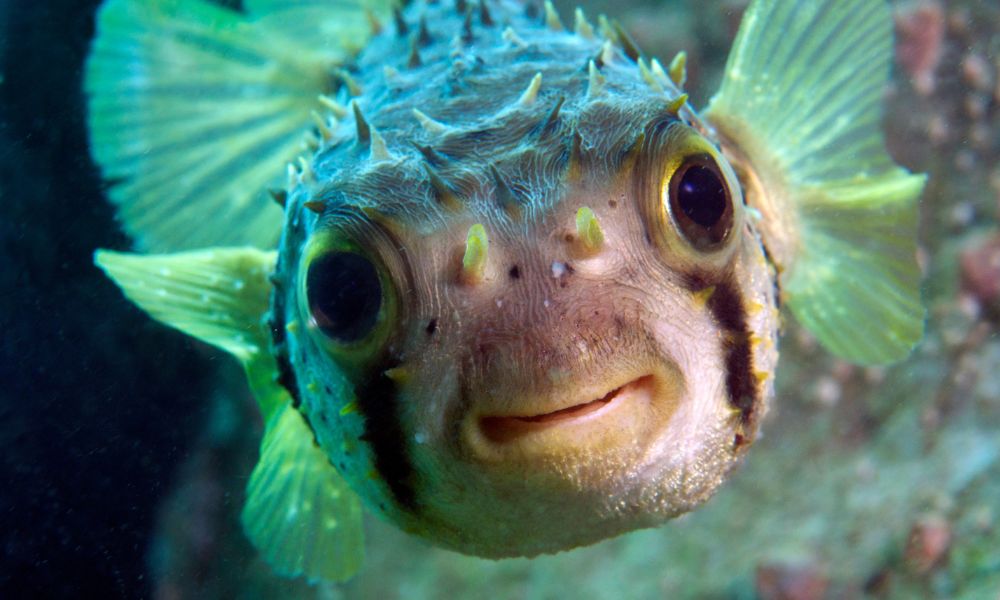A recent presentation for the “Animal Matters” series through Tufts Center for Animals and Public Policy tackled the topic of fish and their overwhelming classification by society as “commodities” — rather than individual, sentient beings — and whether the future could hold a more compassionate shift in perspective.
The U.S. Animal Kill Clock, which tracks the number of animals slaughtered for people’s food, estimates that more than 3.7 trillion fish and 43 trillion shellfish are killed each year in the United States.
Jennifer Jacquet, a professor of environmental science and policy affiliated faculty with the Abess Center for Ecosystem Science and Policy, noted in her Tufts’ talk titled “Fish Are Not Natural Resources” that people’s perceptions about fish, as well limited scientific data published about their sentience, are key factors that need to change.
Jacquet noted that fish endure conditions uncommon to many other wild animals, such as being used as commercial “feed” for other farmed aquatic animals or having their oils worked into supplements for people.
Because so little has been investigated or published about fish sentience, fish and other aquatic species have minimal – if any — welfare protections while they are being farmed or captured from the wild. That limited knowledge also has led to some dangerous misperceptions that society typically uses to justify the existing mass killings under atrocious conditions.
Here are some highlights from the talk about what you should know about fish in today’s world, as well as some recommended actions you can take to help them.
Fish Are Sentient Beings Who Deserve Increased Protections
MYTH: Fish don’t feel and so don’t suffer in industrial fishing. FACT: Fish are sentient animals who deserve to live free from pain and fear and should be protected, but minimal protections and knowledge contribute to their cruel exploitation.
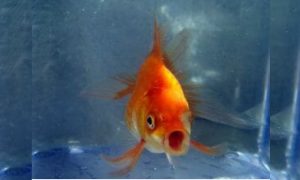
(Photo Credit: Pogrebnoj-Alexandroff via Wikipedia Commons)
People are starting to become increasingly aware that fish are sentient animals with feelings, too. New books, such as Jonathan Balcombe’s What a Fish Knows: The Inner Lives of Our Underwater Cousins is a recent example Jacquet gave.
But there’s currently only published scientific research regarding about 80 of at least 408 species of aquatic animals currently killed for food — or 30 percent.
The often minimal information regarding the abilities and complexities of those studied species also doesn’t result in protection for the animals, Jacquet noted.
As an example, she pointed to recent studies detailing fish sentience and then to examples of suffering in farmed fish, including fish she described as “living corpses” swimming around with sea lice and injuries, as documented by undercover investigations.
She added that even many marine-protected areas exist primarily to support fisheries, rather than to protect fish for their own sake: There’s an underlying belief that healthy marine areas will create more fish for fishing outside of those areas.
People Are Massacring Fish In Devastating and Unnatural Ways
MYTH: People are predators with a “right” to eat fish, just like a leopard or a whale. FACT: Industrial fishing is disproportionately devastating oceans and more than just fish.
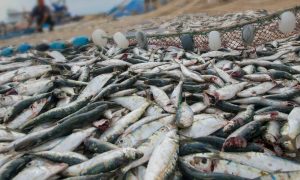
(sezer66/Adobe Stock)
Jacquet said that she’ll frequently hear the argument that people are “predators” with a “right” to prey species, the same as any other animal who eats fish.
But studies have shown that people — particularly via industrial fishing — operate way outside of what is natural in the number of animals killed and where people kill them when compared to other animals.
She cited statistics from the Food and Agriculture Organization (FAO) detailing more than 4.5 million fishing vessels and 40,000 global trawlers in describing people’s evolution as a “massive marine predator.”
She also pointed out that while some of the frequently-cited animals compared to people — such as leopards or cheetahs — are carnivores, most people currently are omnivores.
“For a terrestrial omnivore, we are well outside the patterns of prey diversity and volume,” she said.
Foods Have Different Environmental Impacts
MYTH: Eating fish is not unconscionable because all food production has a cost. FACT: All food production does have a cost — but not all the costs are equal.
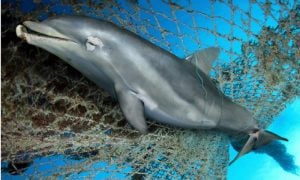
(Alamy)
Another argument sometimes pitched by people — including pescatarians — is that eating fish or other aquatic species is “ok” because all food production creates some kind of impact.
Jacquet quickly countered that by showing that numerous factors — including greenhouse gas emissions, freshwater use, habitat loss and disturbance, and animal welfare concerns — differ dramatically depending on what people choose to consume.
“All food production does have costs, but they are not equal,” she said. “There is also a blindspot with animal welfare impacts, and that blindspot is gigantic.”
The horrific conditions farmed and wild-caught fish often face are becoming better documented. But ocean ecosystems and other animals also are paying the price — including from a view that people are entitled to whatever is in the ocean.
“People will kill sea lions because they are taking ‘our’ salmon,” she said. “People will kill whales because they are taking ‘our’ squid. We live in a global interdependent system, and (there shouldn’t be an) argument that whales are taking ‘our’ fish when whales can’t go onto land and take ‘our’ terrestrial resources.”
Jacquet also mentioned in her talk that industrial fishing — which receives about 81 percent of government subsidies — kills about 73 percent of fish, whereas subsistence fishing — commonly known as people who choose to kill fish to survive, often in poor or resource-strapped areas — makes up only about 2 percent.
Industrial fishing also feeds the wealthiest individuals and countries, she added — noting that allowing industrial fishing to continue as it is today, unchecked, is also destroying these small communities.
A Shift Toward More Compassionate Treatment of Fish Is Possible
MYTH: Society will never change their attitudes toward fish. FACT: Society has had drastic perception and behavior changes toward other marine dwellers — setting a hopeful precedent for fish.
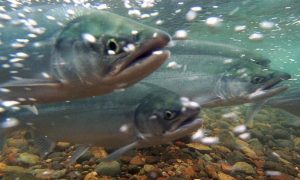
Salmon (Alaska Region U.S. Fish & Wildlife Service/ Flickr)
In 1946, the International Whaling Commission (IWC) primarily existed as an anti-whaling organization. But by 1982, with a massive shift in public attitude, the IWC signed a moratorium on commercial whaling.
Similarly, Jacquet noted that factory farming took awhile to jump onto the radars of animal advocates, who in earlier days focused mainly on companion animals. Now, with effective altruism — a philosophy that focuses on helping the animals who suffer on the most massive scale — shifting a focus to birds and fish, more animal advocates are starting to publicize their plights.
Those examples can provide a path forward for fish and hope for the people who care about them, Jacquet said.
You Can Take Meaningful Action To Help Fish
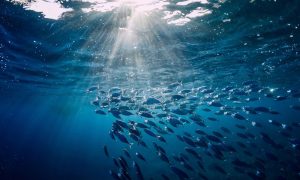
Tuna Fish (artifirsov/Adobe Stock)
Jacquet said people can take meaningful action for fish by first changing how we think about them.
“We can think of them as individuals, as sentient animals who are conscious and capable of feeling pain,” she said.
She encouraged the audience to share and post videos of fish playing, building nests, completing memory tasks, or any other neat behavior to break down the perception of fish as “commodities” or “natural resources.”
She also encouraged people to look at their diets and to re-evaluate their choices if consuming seafood is among them.
Finally, people can advocate for stronger legislative protections for fish. One example of legislation that could make a difference for fish, if proposed, would be that any fish imported into the United States must have come from conditions that would meet minimum standards for U.S. hatcheries.
You can also sign LFT’s petitions for aquatic species, including this one demanding justice for fish killed by gasoline poured into their pond, for the dolphin Li’i to be relocated to a seaside sanctuary, for horseshoe crabs to stop being bled to death, and for restaurants to stop selling fish and chips from endangered sharks, if you haven’t already!

